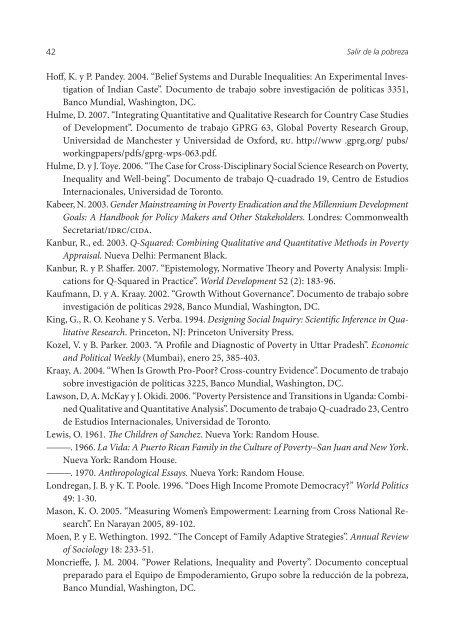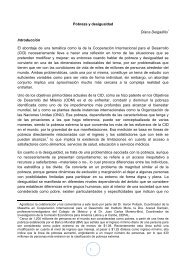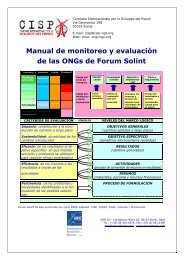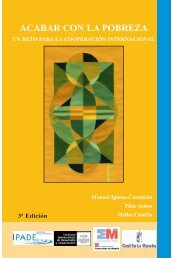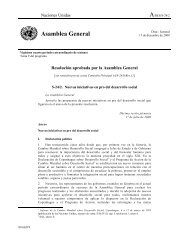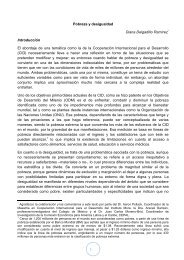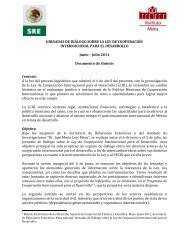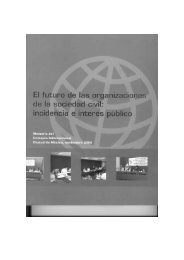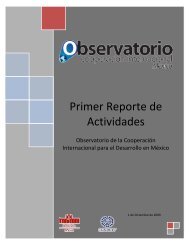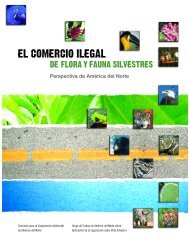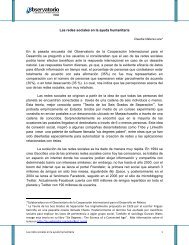- Page 1:
Deepa Narayan y Patti Petesch, edit
- Page 5 and 6:
The findings, interpretations, and
- Page 7 and 8:
vi Salir de la pobreza 8 Combatir l
- Page 9 and 10:
viii Salir de la pobreza 6.1 Conexi
- Page 12 and 13: Prefacio Salir de la pobreza es un
- Page 14 and 15: Prefacio xiii Colaboradores Shelton
- Page 16 and 17: Prefacio Colaboradores xv Anirudh K
- Page 18 and 19: Prefacio xvii Siglas y abreviaturas
- Page 20: Prefacio Siglas y abreviaturas xix
- Page 23 and 24: 2 Salir de la pobreza dad de una pe
- Page 25 and 26: 4 Salir de la pobreza Una perspecti
- Page 27 and 28: 6 Salir de la pobreza El movimiento
- Page 29 and 30: 8 Salir de la pobreza La clase soci
- Page 31 and 32: 10 Salir de la pobreza En su recien
- Page 33 and 34: 12 Salir de la pobreza través de s
- Page 35 and 36: 14 Salir de la pobreza pobres, las
- Page 37 and 38: 16 Salir de la pobreza Las oportuni
- Page 39 and 40: 18 Salir de la pobreza mayoría de
- Page 41 and 42: 20 Salir de la pobreza Enfrentar la
- Page 43 and 44: 22 Salir de la pobreza El dominio d
- Page 45 and 46: 24 Salir de la pobreza si se combin
- Page 47 and 48: 26 Salir de la pobreza los pobres:
- Page 49 and 50: 28 Salir de la pobreza difícil com
- Page 51 and 52: 30 Salir de la pobreza La importanc
- Page 53 and 54: 32 Salir de la pobreza Guatemala pa
- Page 55 and 56: 34 Salir de la pobreza nómico y po
- Page 57 and 58: 36 Salir de la pobreza dificultades
- Page 59 and 60: 38 Salir de la pobreza entonces el
- Page 61: 40 Salir de la pobreza Birdsall, N.
- Page 65 and 66: 44 Salir de la pobreza Portes, A. 2
- Page 68 and 69: 2 La pobreza y la política de excl
- Page 70 and 71: Agencia, estructura de la oportunid
- Page 72 and 73: Agencia, estructura de la oportunid
- Page 74 and 75: Agencia, estructura de la oportunid
- Page 76 and 77: Agencia, estructura de la oportunid
- Page 78 and 79: Agencia, estructura de la oportunid
- Page 80 and 81: Agencia, estructura de la oportunid
- Page 82 and 83: Agencia, estructura de la oportunid
- Page 84 and 85: Agencia, estructura de la oportunid
- Page 86 and 87: Agencia, estructura de la oportunid
- Page 88 and 89: Agencia, estructura de la oportunid
- Page 90 and 91: Agencia, estructura de la oportunid
- Page 92 and 93: Agencia, estructura de la oportunid
- Page 94 and 95: Agencia, estructura de la oportunid
- Page 96 and 97: Agencia, estructura de la oportunid
- Page 98 and 99: 3 Avanzar, rezagarse, perderse: lec
- Page 100 and 101: Avanzar, rezagarse, perderse: lecci
- Page 102 and 103: Avanzar, rezagarse, perderse: lecci
- Page 104 and 105: Avanzar, rezagarse, perderse: lecci
- Page 106 and 107: Avanzar, rezagarse, perderse: lecci
- Page 108 and 109: Avanzar, rezagarse, perderse: lecci
- Page 110 and 111: Avanzar, rezagarse, perderse: lecci
- Page 112 and 113:
Avanzar, rezagarse, perderse: lecci
- Page 114 and 115:
Avanzar, rezagarse, perderse: lecci
- Page 116 and 117:
Avanzar, rezagarse, perderse: lecci
- Page 118 and 119:
Avanzar, rezagarse, perderse: lecci
- Page 120 and 121:
Avanzar, rezagarse, perderse: lecci
- Page 122 and 123:
Avanzar, rezagarse, perderse: lecci
- Page 124 and 125:
Avanzar, rezagarse, perderse: lecci
- Page 126 and 127:
Avanzar, rezagarse, perderse: lecci
- Page 128 and 129:
Avanzar, rezagarse, perderse: lecci
- Page 130 and 131:
Avanzar, rezagarse, perderse: lecci
- Page 132 and 133:
Avanzar, rezagarse, perderse: lecci
- Page 134 and 135:
Avanzar, rezagarse, perderse: lecci
- Page 136 and 137:
Avanzar, rezagarse, perderse: lecci
- Page 138 and 139:
Avanzar, rezagarse, perderse: lecci
- Page 140 and 141:
Avanzar, rezagarse, perderse: lecci
- Page 142 and 143:
Avanzar, rezagarse, perderse: lecci
- Page 144 and 145:
Avanzar, rezagarse, perderse: lecci
- Page 146:
Avanzar, rezagarse, perderse: lecci
- Page 149 and 150:
128 Salir de la pobreza de ingresos
- Page 151 and 152:
130 Salir de la pobreza El enfoque
- Page 153 and 154:
132 Salir de la pobreza Las cifras
- Page 155 and 156:
134 Salir de la pobreza Vemos que l
- Page 157 and 158:
136 Salir de la pobreza Encuesta de
- Page 159 and 160:
138 Salir de la pobreza considerabl
- Page 161 and 162:
140 Salir de la pobreza tugal como
- Page 163 and 164:
142 Salir de la pobreza La relació
- Page 165 and 166:
144 Salir de la pobreza ticas del i
- Page 167 and 168:
146 Salir de la pobreza la familia.
- Page 169 and 170:
148 Salir de la pobreza La diferenc
- Page 171 and 172:
150 Salir de la pobreza sociedad po
- Page 173 and 174:
152 Salir de la pobreza datos de re
- Page 175 and 176:
154 Salir de la pobreza Cuadro A4.B
- Page 177 and 178:
156 Salir de la pobreza Cuadro A4.E
- Page 179 and 180:
158 Salir de la pobreza Cuadro A4.F
- Page 181 and 182:
160 Salir de la pobreza compatible
- Page 183 and 184:
162 Salir de la pobreza Duncan, G.,
- Page 185 and 186:
164 Salir de la pobreza Whelan, C.
- Page 187 and 188:
166 Salir de la pobreza en todos lo
- Page 189 and 190:
168 Salir de la pobreza definición
- Page 191 and 192:
170 Salir de la pobreza pérdida po
- Page 193 and 194:
172 Salir de la pobreza de la pobre
- Page 195 and 196:
174 Salir de la pobreza Categoría
- Page 197 and 198:
176 Salir de la pobreza recuerdos.
- Page 199 and 200:
178 Salir de la pobreza Cuadro 5.3
- Page 201 and 202:
180 Salir de la pobreza Cuadro 5.4
- Page 203 and 204:
182 Salir de la pobreza Entonces, n
- Page 205 and 206:
184 Salir de la pobreza nerales y f
- Page 207 and 208:
186 Salir de la pobreza Razones par
- Page 209 and 210:
188 Salir de la pobreza fueron tra
- Page 211 and 212:
190 Salir de la pobreza escapes de
- Page 213 and 214:
192 Salir de la pobreza No obstante
- Page 215 and 216:
194 Salir de la pobreza Ningún mé
- Page 217 and 218:
196 Salir de la pobreza ———.
- Page 220 and 221:
6 Pobreza, casta y migración en el
- Page 222 and 223:
Pobreza, casta y migración en el s
- Page 224 and 225:
Pobreza, casta y migración en el s
- Page 226 and 227:
Pobreza, casta y migración en el s
- Page 228 and 229:
Pobreza, casta y migración en el s
- Page 230 and 231:
Pobreza, casta y migración en el s
- Page 232 and 233:
Pobreza, casta y migración en el s
- Page 234 and 235:
Pobreza, casta y migración en el s
- Page 236 and 237:
Pobreza, casta y migración en el s
- Page 238 and 239:
Pobreza, casta y migración en el s
- Page 240 and 241:
Pobreza, casta y migración en el s
- Page 242 and 243:
Pobreza, casta y migración en el s
- Page 244 and 245:
Pobreza, casta y migración en el s
- Page 246 and 247:
7 Caminos esquivos para salir de la
- Page 248 and 249:
Caminos esquivos para salir de la p
- Page 250 and 251:
Caminos esquivos para salir de la p
- Page 252 and 253:
Caminos esquivos para salir de la p
- Page 254 and 255:
Caminos esquivos para salir de la p
- Page 256 and 257:
Caminos esquivos para salir de la p
- Page 258 and 259:
Caminos esquivos para salir de la p
- Page 260 and 261:
Caminos esquivos para salir de la p
- Page 262 and 263:
Caminos esquivos para salir de la p
- Page 264 and 265:
Caminos esquivos para salir de la p
- Page 266 and 267:
Caminos esquivos para salir de la p
- Page 268 and 269:
Caminos esquivos para salir de la p
- Page 270 and 271:
Caminos esquivos para salir de la p
- Page 272 and 273:
Caminos esquivos para salir de la p
- Page 274 and 275:
Caminos esquivos para salir de la p
- Page 276 and 277:
Caminos esquivos para salir de la p
- Page 278 and 279:
Caminos esquivos para salir de la p
- Page 280 and 281:
Caminos esquivos para salir de la p
- Page 282 and 283:
Caminos esquivos para salir de la p
- Page 284 and 285:
Caminos esquivos para salir de la p
- Page 286 and 287:
Caminos esquivos para salir de la p
- Page 288 and 289:
Caminos esquivos para salir de la p
- Page 290 and 291:
8 Combatir la extrema pobreza: apre
- Page 292 and 293:
Combatir la extrema pobreza 271 to,
- Page 294 and 295:
Combatir la extrema pobreza 273 de
- Page 296 and 297:
Combatir la extrema pobreza 275 En
- Page 298 and 299:
Combatir la extrema pobreza 277 cue
- Page 300 and 301:
Combatir la extrema pobreza 279 com
- Page 302 and 303:
Combatir la extrema pobreza 281 bus
- Page 304 and 305:
Combatir la extrema pobreza 283 go
- Page 306 and 307:
Combatir la extrema pobreza 285 Cua
- Page 308 and 309:
Combatir la extrema pobreza 287 Las
- Page 310 and 311:
Combatir la extrema pobreza 289 Yo
- Page 312 and 313:
Combatir la extrema pobreza 291 abi
- Page 314 and 315:
Combatir la extrema pobreza 293 per
- Page 316 and 317:
Combatir la extrema pobreza 295 con
- Page 318 and 319:
Combatir la extrema pobreza 297 Una
- Page 320 and 321:
Combatir la extrema pobreza 299 gub
- Page 322:
Combatir la extrema pobreza 301 Wre
- Page 325 and 326:
304 Salir de la pobreza por el peri
- Page 327 and 328:
306 Salir de la pobreza México, co
- Page 329 and 330:
308 Salir de la pobreza enviadas po
- Page 331 and 332:
310 Salir de la pobreza del hogar y
- Page 333 and 334:
312 Salir de la pobreza que “la n
- Page 335 and 336:
314 Salir de la pobreza Remesas col
- Page 337 and 338:
316 Salir de la pobreza Recuadro 9.
- Page 339 and 340:
318 Salir de la pobreza técnico y
- Page 341 and 342:
320 Salir de la pobreza Remesas emp
- Page 343 and 344:
322 Salir de la pobreza entender la
- Page 345 and 346:
324 Salir de la pobreza de remesas.
- Page 347 and 348:
326 Salir de la pobreza esencial co
- Page 349 and 350:
328 Salir de la pobreza Suro, R. 20
- Page 351 and 352:
330 Salir de la pobreza de esa naci
- Page 353 and 354:
332 Salir de la pobreza de las prim
- Page 355 and 356:
334 Salir de la pobreza personas no
- Page 357 and 358:
336 Salir de la pobreza Huehuetenan
- Page 359 and 360:
338 Salir de la pobreza formó una
- Page 361 and 362:
340 Salir de la pobreza rentes orga
- Page 363 and 364:
342 Salir de la pobreza Aunque toda
- Page 365 and 366:
344 Salir de la pobreza Establecer
- Page 367 and 368:
346 Salir de la pobreza Unidos se e
- Page 369 and 370:
348 Salir de la pobreza Arriola, L.
- Page 371 and 372:
350 Salir de la pobreza Rodríguez,


